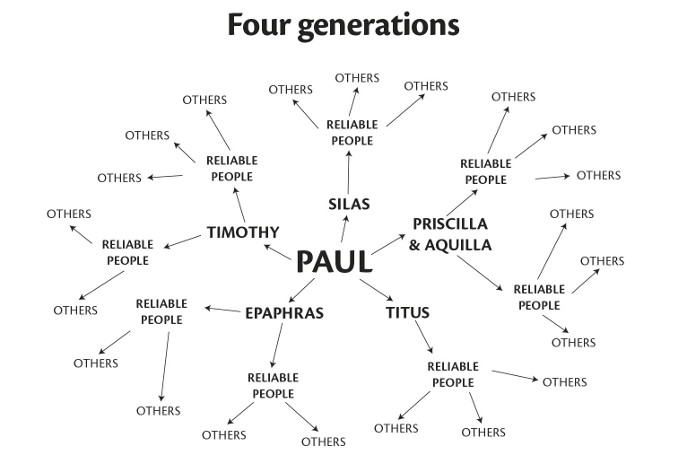Make disciples of all nations
Iain Hesketh
If I was to ask you what is the mission of God’s people, what would you say? The likelihood is that you would quote Matthew 28:18-20. These words are so familiar to us but have we paused long enough to process what Jesus is saying? In this article I want to focus on the phrase ‘make disciples of all nations’ and dig in a little deeper into what Jesus was asking.
The call to ’make disciples’ shouldn’t take too much explanation and yet it is the thing that many are confused by or neglectful of. Many think that it will just happen if only we can get people in the same room, at the same time each week and listen to the voice of a few trusted teachers.
Gatherings and the public reading of God’s Word are crucial, and I like you no doubt, am so thankful for gifted bible teachers that help us to understand and apply God’s Word. Yet it seems that in the current crisis this just isn’t going to be possible in the same way. Could this present an opportunity for us to recalibrate around sending and disciple-making?
 Disciples are made. The apostle John makes it clear that children of God are born by a sovereign act of God as they responded to His invitation to believe in Him and they are made new (John 1:12; 2 Cor 5:17). However, Jesus has tasked those who are part of His family, under the leadership of, and in partnership with the Holy Spirit, to make disciples - that are ‘to become [and help others to become] who Jesus would be if He were you.’ (Dallas Willard)
Disciples are made. The apostle John makes it clear that children of God are born by a sovereign act of God as they responded to His invitation to believe in Him and they are made new (John 1:12; 2 Cor 5:17). However, Jesus has tasked those who are part of His family, under the leadership of, and in partnership with the Holy Spirit, to make disciples - that are ‘to become [and help others to become] who Jesus would be if He were you.’ (Dallas Willard)
In many respects, everything has changed because of COVID-19 and yet nothing has changed. We are still called to make disciples of all nations but maybe this crisis has served to show the ways that we have done this well and not so well! This is not a criticism but my reflection of what we may have made discipleship out to be, whether that is by commission or omission.
At the beginning of lockdown I made a monumental decision; I decided to build a desk. The previous owners of our house had left behind some scaffolding boards that were of little use to us, as we neither had scaffolding nor did I have the desire to get any; I don’t like heights! Some of you would lap this kind of project up and think nothing of it, but for me, it was a significant moment; but having made the decision to build it, I had come to terms with the fact that it wasn’t going to build itself no matter how much I imagined making it in my mind!
Sometimes we can be fooled into thinking that just because we talk about discipleship and tell people what they should do; we think we are making disciples. The problem is that just like no amount of research or others telling me what to do was going to get the desk built. I had to get my hands dirty. Could I have bought a desk? Sure; but where would have been the fun in that?! I’m far less likely to dispose of my handcrafted desk than one bought from a shop, and now I have some albeit very limited experience, I could build one for someone else and then eventually begin to teach others how to do it. My desk isn’t fancy, it is really simple in fact, yet it does exactly what it is supposed to do! You see, a desk doesn’t need to be complicated, it just needs to do what it is supposed to do. Disciple-making means getting our hands dirty and do what we’ve been designed to do!
To make disciples, the way Jesus made disciples, doesn’t look like preaching to hundreds or even thousands of people, but more like investing all you know into a small group of people who are eager to learn what it looks like to follow Jesus. Yes, Jesus preached to thousands but it was to call out disciples not to make them!
Matthew records the calling of Simon Peter, Andrew, James and John:
 As he was walking along the Sea of Galilee, he saw two brothers, Simon (who is called Peter), and his brother Andrew. They were casting a net into the sea—for they were fishermen. 19 “Follow me,” he told them, “and I will make you fish for? people.” 20 Immediately they left their nets and followed him. Going on from there, he saw two other brothers, James the son of Zebedee, and his brother John. They were in a boat with Zebedee their father, preparing their nets, and he called them. 22 Immediately they left the boat and their father and followed him. Matthew 4:18–22 (CSB)
As he was walking along the Sea of Galilee, he saw two brothers, Simon (who is called Peter), and his brother Andrew. They were casting a net into the sea—for they were fishermen. 19 “Follow me,” he told them, “and I will make you fish for? people.” 20 Immediately they left their nets and followed him. Going on from there, he saw two other brothers, James the son of Zebedee, and his brother John. They were in a boat with Zebedee their father, preparing their nets, and he called them. 22 Immediately they left the boat and their father and followed him. Matthew 4:18–22 (CSB)
What was it Jesus was making exactly? He was in fact training disciple-making missionaries first and foremost and in the process, He was teaching them how to be leaders and church planters; movement makers. Is our discipleship too safe, too processed and risk-averse to develop movement makers? Is this kind of leadership and disciple-making too much of a challenge to our overly controlling leadership cultures?
 The call to follow Jesus was to pledge full allegiance to Jesus and His mission. This was demonstrated through obedience. They were to walk with Him, learn everything He taught and imitate His very way of life. Why did these men so quickly drop everything to follow Jesus? Well, in a world where being chosen to follow a Rabbi was like today’s equivalent of every boy dreaming of being a professional footballer, boys would dream of being a Rabbi. The thing is, only the most talented of boys would get to follow a Rabbi and then actually become Rabbis. Would be disciples would have to ask to be disciples of their chosen Rabbi, the Rabbi would then test them to see if they had what it took to be their disciple. It is likely the men Jesus called had either failed the test or hadn’t even bothered to sit the test in the first place because they knew they weren't good enough.
The call to follow Jesus was to pledge full allegiance to Jesus and His mission. This was demonstrated through obedience. They were to walk with Him, learn everything He taught and imitate His very way of life. Why did these men so quickly drop everything to follow Jesus? Well, in a world where being chosen to follow a Rabbi was like today’s equivalent of every boy dreaming of being a professional footballer, boys would dream of being a Rabbi. The thing is, only the most talented of boys would get to follow a Rabbi and then actually become Rabbis. Would be disciples would have to ask to be disciples of their chosen Rabbi, the Rabbi would then test them to see if they had what it took to be their disciple. It is likely the men Jesus called had either failed the test or hadn’t even bothered to sit the test in the first place because they knew they weren't good enough.
So here’s the thing, Jesus didn’t accept volunteers! He chose people! He chose them then and He chooses people now. He saw something in these young men so He called them. Their only choice was whether to follow or not. But why wouldn’t they? A Rabbi had asked them to be His disciples! Jesus is still searching for people who will respond to His call to follow Him and be made into disciple-making missionaries. I use the term missionary in the broadest sense, of one being sent to proclaim the good news of Jesus (John 21:20). The only question we must ask is; to where are we being sent?
Can I suggest that for Jesus, discipleship wasn’t so much about getting His apprentices to follow a moral code but more about them receiving the fullness of life? Having been led into life by Jesus (John 14:1-17) it would surely begin to alter their internal moral code (John 15:1-11), which would be evidenced in the way they behaved and spoke. Jesus took them on a journey of transformation that affected the whole of their lives. Following Jesus, they would learn to be true worshippers (Matt 22:37), they would learn to obey Jesus and how to help others obey him too (John 15:9-17), and finally He would equip them to be partners in the mission and to carry it on when He had gone (Matt 4:19; 28:18-20). Oh, and there would never be a promotion to be a Rabbi, as there was only ever going to be one master and His name is Jesus. The call to follow was and still is, a life-long call of submission and allegiance to King Jesus.
The most natural thing for an apprentice to do is to copy what they see their trainer do, so it is little wonder that we see the pattern replicated by the apostles in the book of Acts. We see the fruit of this pattern none more so than through the apostle Paul’s ministry. Paul writes in Romans 15:19b, 23 (CSB): As a result, I have fully proclaimed the gospel of Christ from Jerusalem? all the way around to Illyricum... But now I no longer have any work to do in these regions, and I have strongly desired for many years to come to you.
How is it, that one man could reach so many in a 15 year period covering 10,000 miles? It was because he was relentless in his pursuit to make Jesus known to the unreached but most importantly, he didn’t do it alone. He identified, trained and released other missionary disciple-makers and encouraged them to do the same (2 Tim 2:2).

https://www.hardysbc.net/noplaceleft
So what about us?
If the missionary task isn’t yet complete, how then do we train more disciple-makers than ever before? Might I suggest we follow the model of Jesus and Paul, and all the movement starters that have gone before us? You might say, but this doesn’t fit with our culture, well that may be so but could I humbly suggest it wasn’t the culture that Jesus stepped into either. The principles that Jesus set for disciple-making are not bound by time and culture but are tools to shape culture according to the Kingdom.
Start small:
Jesus started small and continued working in the small and hidden, never getting distracted or dazzled by the crowds. He proclaimed the message of the Kingdom to the masses and taught the way of the Kingdom to a few in order to truly equip them. Why? Because He knew that if He could lead a few to really believe in Him and do what He did, then the Kingdom of God would advance in ways that would be unstoppable. Jesus showed them how to follow by inviting a few so close, they could see and experience it for themselves. He also didn’t wait too long to launch them into ministry opportunities because He knew who He had called. Maybe we hesitate to release people because we don’t know them? It seems to me that Jesus took some risks in discipling the twelve in order that they grew. Jesus’ disciple making formula was about helping His disciples to step into all that God had purposed for them and glorifying the One who sent Him. Disciple-making is by nature a radically other focus activity.
Start where you are:
Disciple-making then is not about an ‘off-the-shelf’ course, a quick fix from a visiting preacher or the next leadership expert flying in. It is about everyday men and women called by Jesus to follow Him, obey His teaching and equip others to do likewise. Our worker in West Africa and his church planters, disciple people who don’t yet know Jesus because they understand that the process of discipleship is helping people move from unbelief to belief and not simply passing on information about Jesus. Information that does not lead to application to one's life will never result in the transformation Jesus desires for those who call themselves followers. A belief that informs the way we live in all of life is a truly powerful witness to the resurrected Christ.
Simple reproducible patterns:
Have we made our discipleship processes too complicated, so that it is only those who are Bible college-trained can disciple others? Disciple-making the way that Jesus modelled it is focused on the disciple-maker and fellow pilgrims being committed to three crucial relationships: 1) Love God; passionate pursuit of God as a worshipper. We cannot be true worshippers and be unchanged in our innermost parts. 2) Love one another; connected in community to serve one another and provoke our brothers and sisters to be all that God has created them to be. 3) Love the last, lost and least; committed to mission and in so doing, show kindness and compassion, and the greatest kindness of all? Telling them that Jesus died for our sin and on the third day rose again conquering death (1 Cor 15:3, 4).
Reproduce, Raise, Release,
Oscar Muriu, Bishop of the Nairobi Chapel network of churches, who at the time was senior pastor and had seen hundreds of churches planted, was asked by Steve Addison (conversation recounted in his book: ‘Movements that Change the World’) what his success could be attributed to? This was his response:
“All I do is copy. You don’t have to be clever to copy. I look at Scripture and ask, ‘What did Jesus do?’ They call that obedience.” [Steve recalls] One statement he made that I will never forget was, “Steve, I don’t plant churches. I grow sons.” And some of his best ‘sons’ are daughters.
It is obvious that no one individual will reach a village let alone a nation. No one network will reach a continent. But dare we believe that together, in partnership, as we raise and release reproducing disciple-making sons and daughters to go and do likewise, we will join with the Spirit in fulfilling the commission of Jesus to reach unreached villages, towns, cities, and nations. Making disciples is about the ‘whole church taking the whole gospel to the whole world!’ (Lausanne Movement)
Questions
-
From what you have read, what one thing provoked a response in you?
-
Today, what are you going to do with it?
-
From what you have read, what needs to change in your life?